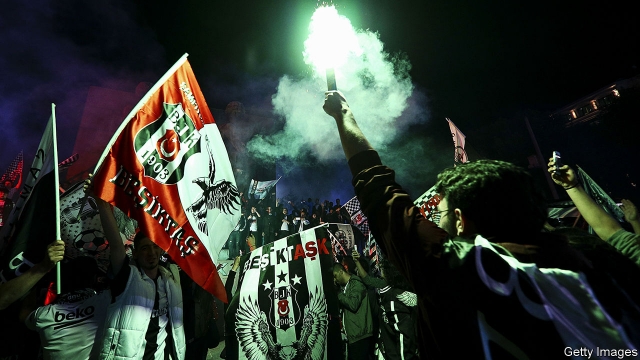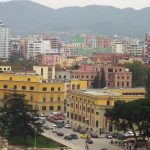The ritual begins before dusk, at one of the restaurants in Besiktas, a neighbourhood perched on Istanbul’s European shore, with fish, meze and raki, or in a local square, with stuffed mussels from Ahmet’s, meatballs grilled by a headscarved auntie, and canned beer. Always, there is music. Fans swathed in black and white, the colours of Besiktas football club, roar out its anthems. One decries the state of the world. Another speculates about the sexual habits of rival teams. A couple of men dance to the shrill, spellbinding tune of a Roma musician’s zurna pipe and the beat of a large drum. Someone lights a red flare.
Soon crowds stream from the taverns and march southwards, along the Bosphorus, the waterway that cleaves the city between two continents. They advance past the Naval Museum and the sumptuous Dolmabahce Palace, from which the last Ottoman sultans observed the collapse of their empire, past the adjacent mosque where the call to prayer booms out, past honking cars and troubadours eulogising Mustafa Kemal Ataturk, modern Turkey’s founding father, and into the stadium.
And then the true delirium begins. These days, many football matches in Europe have the air of a family picnic, interrupted only sporadically by a chant or applause. Besiktas fixtures resemble choreographed riots. The fans once set the world record (at 132 decibels, as ear-splitting as a fighter jet during take-off) for the loudest crowd at a game. Moments before the match starts they hush into silence, then begin to hum, first softly, then louder, like a colossal swarm of bees. At kick-off, the swarm erupts into song. The chanting persists until the final whistle. In a stadium with more than 40,000 seats, practically no one ever sits down.
Attend a Besiktas match, or almost any other in Turkey, lap up the revelry and the anthems, and you might think football has survived the country’s descent into autocracy unscathed. It has not. As in most places, only more so, politics and football (and business) have always been intertwined in Turkey, never more tightly than in the tumultuous past decade. “Believe, boys, believe,” bellow the denizens of Besiktas’s northern stands. “Sunny days will come,” answer their counterparts at the southern end of the stadium. Many are talking about more than just the game.
The man whose words inspired that song, Nazim Hikmet, was a Marxist poet who died in exile in 1963 after more than a decade behind bars. Besiktas fans have traditionally been attracted to leftist causes, and to dissent. The Carsi—as the most hardcore Besiktas supporters are known—draw the a in their name in the shape of the symbol for anarchism. They have turned protest into an art form. Using banners often stitched from bedsheets, they have protested against racism, the murder of an Armenian journalist by a teenage nationalist, dam construction in Turkey’s south-east and nuclear power plants in the north. They even protest against themselves. “Carsi is against everything,” proclaims one popular banner. “Carsi is against itself too,” reads another.
Football fans, and especially the Carsi, were in the vanguard of anti-government protests in 2013, and bore the brunt of the resulting crackdown. During one demonstration, supporters clashed with police near the residence of Turkey’s president, Recep Tayyip Erdogan. Months later, 35 were charged with forming a terrorist group and attempting to bring down the government. (They faced life sentences, but were acquitted after a lengthy trial.) The same year, the government outlawed the chanting of political slogans at games. Then the league launched a new electronic ticketing system (operated by a subsidiary of a firm once run by Mr Erdogan’s son-in-law, Berat Albayrak, the finance minister), which made it easier to monitor offenders.
The new system has curbed hooliganism, which plagued Turkish football for decades. It has also helped throttle dissent. “They’ve turned us from fans into spectators, and then into customers,” says Cem Yakiskan, a Carsi leader. Both inside the stadiums and in the country at large, the squeeze on free expression has sharpened since 2016, when an army faction backed by members of the Gulen movement, a powerful Islamic sect once allied to Mr Erdogan, staged a bloody coup attempt.
All the president’s men
At a Besiktas game two years ago, a group of fans unfurled a banner in support of two teachers who went on hunger strike after being dismissed (along with 125,000 other government employees) in the wake of the abortive coup. The fans were detained on terror charges. Around the same time, the league fined a club from Diyarbakir, the heart of the south-east region where Kurds form a majority, for changing its name to Amedspor, after the city’s Kurdish moniker. One of the team’s players was recently banned from professional football and given a suspended 18-month sentence for “terrorist propaganda”. He had criticised a military offensive against Kurdish separatists and expressed sympathy with its victims.
Along with Fenerbahce, Galatasaray and Trabzonspor, Besiktas is one of four clubs that have dominated Turkish football for as long as anyone can remember. Between them, they have won the league championship in all but one of the past 60 years. Success has been costly: expensive players have pushed the clubs deep into the red. Yet because football fans are voters, and because nearly every Turk is a fan, governments have had no qualms about saving the best-loved teams from bankruptcy. In January Turkey’s banking association announced that it would restructure the debts of all the clubs in the top division.
Money has not always been the only thing at stake, however. In 2011 Aziz Yildirim, then Fenerbahce’s chairman, was arrested on match-fixing charges, along with dozens of players, coaches and referees. He claimed to have been framed by the Gulenists. When the alliance between the government and the Gulenists crumbled, so did the case against Mr Yildirim. Convicted by one court in 2012, he was acquitted by another three years later. In 2016 policemen and lawyers involved in the probe were themselves arrested. The scandal is so mired in the country’s noxious politics, writes John McManus in “Welcome to Hell?”, an engaging book about football and Turkish society, that determining what actually happened may be impossible.
Now the government’s influence is making the leap from the stands to the pitch. Lately the big four have been challenged by Istanbul Basaksehir, which joined the top league only a decade ago. It takes its name from a sprawling neighbourhood on the city’s outskirts, home to the sort of conservative voters who form the backbone of Mr Erdogan’s Justice and Development (ak) party. The chairman is a relative of Mr Erdogan’s wife. The stadium was built by a firm with a knack for winning big government tenders.
Basaksehir has surprisingly deep pockets. Its squad includes Turkey’s most recognisable player, Arda Turan, as well as several foreign stars. These assets have not translated into popularity: despite Mr Erdogan’s exhortations for young ak voters to go to home games, the average attendance is under 4,000. The stands are empty. But the team is winning. With four months of the season to go, it is set fair to win the title.
For Basaksehir and its powerful backers, those sunny days seem to have come. To some Turkish fans, the game they love, which was once an arena for opposition politics, seems increasingly to have been tainted by authoritarianism.



